
Wind Engineering
Scope & Guideline
Advancing Research in Renewable Energy Engineering.
Introduction
Aims and Scopes
- Wind Turbine Design and Optimization:
Research focused on the structural and aerodynamic design of wind turbines, including the analysis of blade profiles, materials, and innovative designs to improve performance and reduce costs. - Control Systems for Wind Energy Conversion:
Development and enhancement of control strategies for optimizing power output, improving stability, and managing the dynamic behavior of wind energy systems. - Wind Resource Assessment and Forecasting:
Studies that involve evaluating wind energy potential using various statistical and computational methods, including machine learning techniques for accurate wind speed prediction. - Hybrid Renewable Energy Systems:
Investigation into the integration of wind energy with other renewable sources, such as solar and hydro, to create efficient and sustainable energy systems. - Environmental Impact and Sustainability:
Research addressing the environmental implications of wind energy systems, including noise, wildlife impact, and lifecycle assessments to ensure sustainable practices. - Innovative Technologies and Materials:
Exploration of new technologies and materials that enhance the performance and reliability of wind turbines, including advancements in sensor technologies and predictive maintenance.
Trending and Emerging
- Machine Learning and AI in Wind Energy:
The application of machine learning and artificial intelligence techniques for predictive modeling, fault detection, and optimization of wind energy systems is rapidly gaining traction, reflecting the broader technological advancements. - Advanced Control Strategies:
There is an increasing emphasis on developing sophisticated control algorithms, including adaptive and robust control techniques, to enhance the performance and reliability of wind energy systems. - Offshore Wind Energy Solutions:
Research focused on offshore wind energy development is on the rise, driven by the growing demand for renewable energy and the unique challenges associated with offshore installations. - Energy Storage and Hybrid Systems:
The integration of energy storage solutions with wind energy systems is emerging as a critical area of research, addressing issues of intermittency and grid stability. - Sustainability and Lifecycle Assessments:
A growing trend towards evaluating the sustainability of wind energy systems through lifecycle assessments and environmental impact studies is evident, driven by regulatory and societal pressures for greener technologies.
Declining or Waning
- Traditional Wind Energy Systems:
Research pertaining to conventional wind turbine systems and their basic operational principles has seen a reduction in focus as the field evolves towards more advanced, hybrid, and integrated systems. - Basic Aerodynamic Studies without Advanced Modeling:
Studies that do not employ modern computational fluid dynamics (CFD) or advanced analytical techniques are becoming less common as more researchers adopt these sophisticated methodologies. - Passive Control Methods:
There is a diminishing interest in passive control strategies for wind turbines as active control methods, which offer greater adaptability and efficiency, gain prominence.
Similar Journals
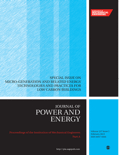
PROCEEDINGS OF THE INSTITUTION OF MECHANICAL ENGINEERS PART A-JOURNAL OF POWER AND ENERGY
Exploring the Frontiers of Mechanical EngineeringPROCEEDINGS OF THE INSTITUTION OF MECHANICAL ENGINEERS PART A-JOURNAL OF POWER AND ENERGY, published by SAGE PUBLICATIONS LTD, is a pivotal journal dedicated to advancing the fields of mechanical engineering and energy technology. With a history spanning from 1983 to 2024, this journal provides a respected platform for researchers and practitioners to disseminate findings that address contemporary challenges in power generation, energy efficiency, and sustainable engineering practices. As evidenced by its quarter ranking in Q3 within the categories of Energy Engineering and Power Technology, and Mechanical Engineering, it serves as a significant resource for academics aiming to enhance their understanding and explore innovation in these critical areas. While currently not an open-access journal, the research published here is invaluable for both ongoing education and professional practice, making it an essential read for anyone engaged in the engineering disciplines.
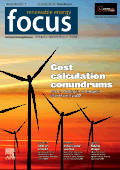
Renewable Energy Focus
Exploring Innovative Pathways in Renewable EnergyRenewable Energy Focus is a premier journal published by Elsevier, dedicated to advancing the field of renewable energy and sustainability. With an ISSN of 1755-0084 and an E-ISSN of 1878-0229, this journal serves as a vital platform for researchers, professionals, and students interested in innovative solutions to energy challenges. Established in 2007, the journal has evolved to become a recognized authority in the subject area, currently ranked in the Q2 quartile of its category for 2023, emphasizing its significance in promoting impactful research. The journal encompasses a wide range of topics, including solar, wind, bioenergy, and sustainable practices that contribute to environmental conservation and energy efficiency. As part of Elsevier's commitment to disseminating high-quality research, Renewable Energy Focus is indexed in Scopus, currently holding a rank of #92/270 in the energy sector, positioning it in the 66th percentile of its field. This journal offers an essential resource for those dedicated to fostering sustainable energy solutions.
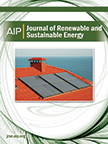
Journal of Renewable and Sustainable Energy
Empowering Tomorrow's Energy InnovationsThe Journal of Renewable and Sustainable Energy, published by AIP Publishing, stands at the forefront of research in the fields of renewable energy and sustainable practices. With an ISSN of 1941-7012, this journal aims to foster innovative research and exchange of knowledge on sustainable technologies and methodologies that contribute to environmental conservation and energy efficiency. Achieving a prestigious Q2 ranking in the category of Renewable Energy, Sustainability, and the Environment, it ranks 135 out of 270 journals in Scopus, signifying its impactful contributions to the field. The journal, active from 2010 to 2024, provides a platform for authors, analysts, and practitioners to disseminate significant findings that can shape future environmental policies and energy frameworks. Although not currently an Open Access publication, it remains an essential resource for researchers dedicated to advancing sustainable development and energy solutions.
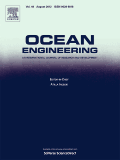
Ocean Engineering
Transforming Challenges into Oceanic OpportunitiesOcean Engineering, published by PERGAMON-ELSEVIER SCIENCE LTD, is a prestigious peer-reviewed journal that has been at the forefront of marine sciences since its inception in 1968. With an impressive impact factor and recognition in the Q1 quartile of both Environmental Engineering and Ocean Engineering, it stands as a key resource for researchers, professionals, and students alike. This journal focuses on a wide range of topics relevant to the field, including coastal engineering, marine resource management, and ocean dynamics, aiming to bridge theoretical research and practical applications. As ranked 14th in Ocean Engineering according to Scopus, it reflects the influential contributions of its articles and provides a platform for innovative discoveries that advance the field. Although not open-access, it offers diverse subscription options for accessing cutting-edge research. The journal’s ongoing legacy of publishing high-quality research continues to contribute significantly to the advancement of knowledge in ocean-related engineering disciplines.
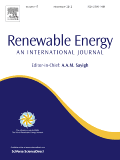
Renewable Energy
Advancing Sustainability Through Cutting-Edge Research.Renewable Energy is a prestigious international journal published by PERGAMON-ELSEVIER SCIENCE LTD, dedicated to advancing the field of renewable energy technologies and their applications. Since its inception in 1991, this journal has provided a critical platform for researchers, professionals, and students to explore innovative solutions in renewable energy, sustainability, and environmental protection. With an impressive impact factor and ranked in the top quartile (Q1) of its category, Renewable Energy is recognized for its high-quality, peer-reviewed research that significantly contributes to the scientific and professional discourse in the sector. The journal is indexed in Scopus, holding an esteemed rank of #21 out of 270 in its field, underscoring its influence and reach. Researchers can access the journal’s articles through traditional subscriptions, ensuring a broad dissemination of vital knowledge that supports the global transition to sustainable energy sources. Addressed from its headquarters in Oxford, England, Renewable Energy is crucial for anyone involved in the journey towards a sustainable future, fostering collaboration and innovation in a critical area of environmental science.
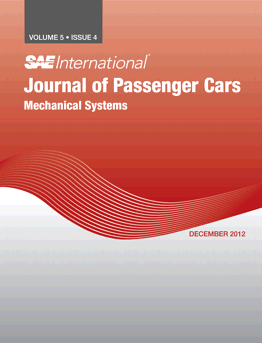
SAE International Journal of Passenger Cars-Mechanical Systems
Exploring the Future of Passenger Car DynamicsSAE International Journal of Passenger Cars-Mechanical Systems, published by SAE International, serves as a vital platform for researchers, engineers, and industry professionals focused on the dynamics of passenger vehicle mechanical systems. With an ISSN of 1946-3995 and E-ISSN of 1946-4002, this journal bridges academic research with practical applications in the automotive field. Although coverage in Scopus was discontinued after 2021, the journal has still contributed significantly to the realms of automotive engineering, safety, and mechanical engineering, evidenced by its Scopus rankings and percentiles across various categories, including a rank of #57 in Automotive Engineering. This multidisciplinary journal is key for those looking to advance their knowledge and explore innovative solutions in automotive mechanics, with an emphasis on enhancing vehicle performance, reliability, and safety. While current open access options are detailed further on their website, the journal continues to maintain a commitment to disseminating valuable insights that can shape future automotive technologies and practices.

Joule
Empowering Sustainable Solutions for TomorrowJoule, published by CELL PRESS, is a premier journal dedicated to the rapidly evolving field of energy research. Since its inception in 2017, Joule has established itself as a leading source of high-impact studies in energy, achieving an outstanding Q1 ranking in the Energy (miscellaneous) category and ranking #1 out of 73 in the general energy field, placing it within the 99th percentile according to Scopus metrics. The journal aims to advance the understanding of diverse energy forms and their applications, providing a platform for significant breakthroughs that can drive sustainable practices and innovative technologies. Through rigorous peer review and expert contributions, Joule serves as an invaluable resource for researchers, professionals, and students engaged in tackling some of the most pressing energy challenges of our time. Based in the United States, Joule continues to foster collaboration and interdisciplinary approaches in energy research, striving to illuminate pathways toward a sustainable future.

Journal of the Japan Institute of Energy
Pioneering Insights in Energy Engineering.Journal of the Japan Institute of Energy, ISSN 0916-8753, is a reputable academic journal dedicated to the field of energy studies, reflecting the dynamic and evolving landscape of energy research. Published by the Japan Institute of Energy, the journal serves as a platform for disseminating innovative research, technologies, and methodologies related to energy engineering, renewable energy sources, and sustainability practices. While this journal does not currently offer open access, it remains a vital resource for professionals, researchers, and students alike, particularly those focused on advancing knowledge within Energy Engineering and Power Technology, Fuel Technology, and related areas. As of 2023, it is ranked in the Q4 quartile across several categories in Scopus, which highlights its foundational role in fostering scholarly discourse, despite its lower ranking in the competitive global landscape. Established in 1990 and continuously evolving, the journal provides insights into the challenges and innovations in the energy sector, making it an essential read for anyone invested in the future of energy solutions.

Advances in Energy Research
Advancing Knowledge for a Greener Energy Future.Advances in Energy Research is a prominent journal dedicated to the exploration and advancement of energy technologies and sustainable practices. Published by TECHNO-PRESS, this journal serves as a vital platform for researchers, professionals, and students in the energy field, featuring innovative studies and reviews that contribute to the body of knowledge surrounding energy efficiency, renewable resources, and the integration of new technologies. The journal holds a significant position in energy research and aims to facilitate the dissemination of groundbreaking findings and ideas that are pivotal for the transition toward a more sustainable energy future. Located in South Korea, with an ISSN of 2287-6316, it embraces an open access philosophy that ensures widespread availability of its content, further enhancing its impact in the academic community.
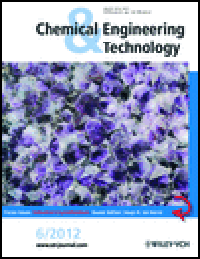
CHEMICAL ENGINEERING & TECHNOLOGY
Shaping the Future of Chemical Processes and TechnologiesChemical Engineering & Technology is a prestigious journal published by Wiley-VCH Verlag GmbH, focusing on the evolving field of chemical engineering and its related disciplines. With an ISSN of 0930-7516 and E-ISSN of 1521-4125, the journal has established a robust platform for researchers and practitioners to share pioneering studies and innovative technologies within the field. Classified in the second quartile (Q2) across multiple categories such as Chemical Engineering, Chemistry, and Industrial and Manufacturing Engineering, it holds an impressive rank in the Scopus database, indicating its significant contribution to the academic community. The journal's commitment to advancing knowledge is reflected in its extensive convergence of research from 1987 to 2024, providing a comprehensive archive of scholarly work. Researchers, professionals, and students benefit from the latest insights and findings, enriching the dialogue around chemical processes and methodologies. Though it operates under a traditional subscription model, the accessibility of this journal is crucial for those engaged in both theoretical and applied aspects of chemical engineering.